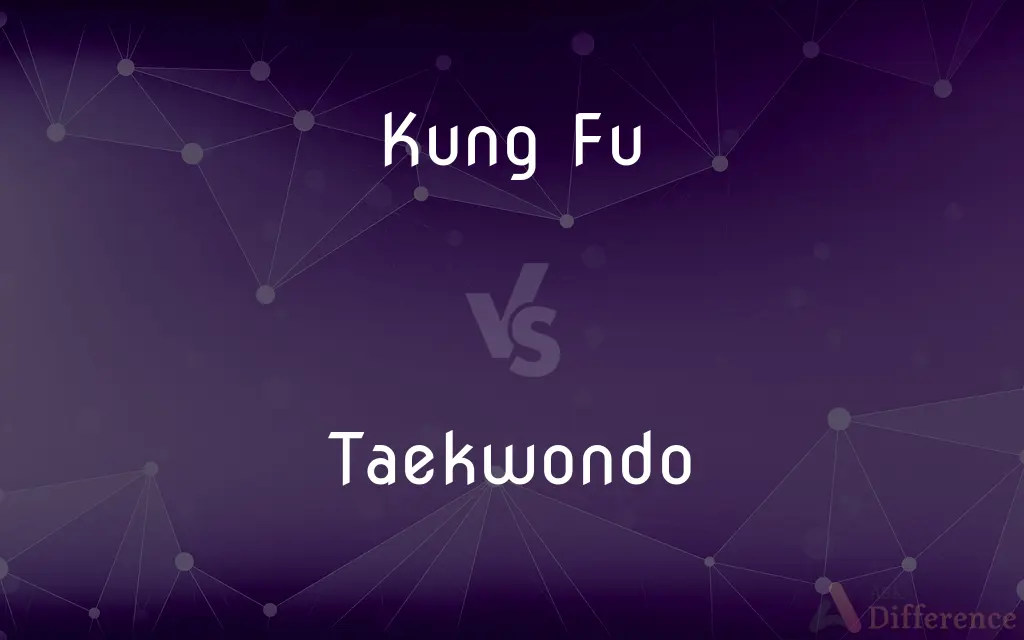Kung Fu vs. Taekwondo — What's the Difference?
Edited by Tayyaba Rehman — By Fiza Rafique — Published on November 28, 2023
Kung Fu is a broad term for Chinese martial arts, emphasizing hand and arm techniques. Taekwondo is a Korean martial art focusing primarily on high kicks and jumping/spinning kicks.

Difference Between Kung Fu and Taekwondo
Table of Contents
ADVERTISEMENT
Key Differences
Kung Fu has ancient roots in China, drawing from various traditions and philosophies over centuries. Taekwondo, on the other hand, is a relatively modern martial art developed in Korea in the mid-20th century, integrating older Korean martial arts with some foreign influences.
Kung Fu encompasses a vast range of techniques, including punches, kicks, throws, and joint locks, often inspired by animal movements. Taekwondo is known for its emphasis on high, fast kicks and jumping and spinning kicks.
Kung Fu often incorporates Buddhist and Taoist philosophies, emphasizing balance, patience, and fluidity. Taekwondo, while also promoting mental discipline, stresses tenets like courtesy, integrity, perseverance, self-control, and indomitable spirit.
Kung Fu training often includes weapons, qigong (energy exercises), and a wide variety of forms or katas. In Taekwondo, training predominantly revolves around sparring, basic techniques, and poomsae (forms).
Kung Fu, particularly through figures like Bruce Lee, has had a significant cultural impact globally. Taekwondo, meanwhile, is an Olympic sport and one of the world's most practiced martial arts.
ADVERTISEMENT
Comparison Chart
Origin
China
Korea
Techniques Emphasized
Hand and arm techniques, various kicks, and animal forms.
High kicks, jumping and spinning kicks.
Philosophy
Buddhist and Taoist philosophies.
Tenets such as courtesy, integrity, and perseverance.
Training Elements
Includes weapons and qigong.
Focuses on sparring and poomsae (forms).
Global Recognition
Culturally significant, popularized by movies and figures.
Olympic sport and widely practiced globally.
Compare with Definitions
Kung Fu
Techniques that emphasize fluidity and balance.
Her Kung Fu movements were graceful and powerful.
Taekwondo
A modern martial art with ancient Korean roots.
Though Taekwondo is modern, it draws from ancient Korean martial traditions.
Kung Fu
A discipline where practitioners might learn various weapons and forms.
In his Kung Fu class, he was learning the staff technique.
Taekwondo
A Korean martial art emphasizing high kicks.
She won a gold medal in Taekwondo at the Olympics.
Kung Fu
Martial arts incorporating Buddhist and Taoist principles.
Kung Fu teaches more than just fighting; it's a way of life.
Taekwondo
Known for dynamic jumping and spinning kicks.
His Taekwondo display was a spectacle of aerial kicks.
Kung Fu
Made globally popular by movies and iconic figures.
Kung Fu films from the 70s ignited global interest in the martial art.
Taekwondo
A discipline with core tenets guiding behavior and practice.
Taekwondo students recite tenets like integrity and perseverance.
Kung Fu
A range of Chinese martial arts.
He practiced Kung Fu for over a decade.
Taekwondo
An Olympic sport practiced worldwide.
Children globally take Taekwondo lessons for discipline and self-defense.
Kung Fu
Alternative spelling of kung fu
Taekwondo
A martial arts form from Korea, known for its elaborate kicking techniques. The sparring aspect is a recognised Olympic sport.
Common Curiosities
How old is Kung Fu?
Kung Fu has ancient roots, with some forms dating back thousands of years.
Where did Taekwondo originate?
Taekwondo originated in Korea.
What is Kung Fu?
Kung Fu is a collective term for various Chinese martial arts.
Is Taekwondo mainly about kicking?
While Taekwondo emphasizes kicks, it also includes punches, blocks, and self-defense techniques.
Do both Kung Fu and Taekwondo have belt ranking systems?
Yes, both martial arts typically use colored belts to signify a student's rank and progression.
Why is Kung Fu often associated with animal forms?
Many Kung Fu styles mimic animal movements, believing they embody specific martial principles.
Which is better for self-defense, Kung Fu or Taekwondo?
Both offer self-defense techniques, but their effectiveness depends on the practitioner and specific situation.
Is Taekwondo suitable for children?
Yes, many Taekwondo schools offer classes specifically for children, emphasizing discipline and respect.
How has Kung Fu influenced popular culture?
Kung Fu has heavily influenced movies, TV shows, and video games, popularizing martial arts globally.
Does Taekwondo focus on mental training?
Yes, Taekwondo emphasizes mental discipline alongside physical techniques.
How do Kung Fu and Taekwondo differ in philosophy?
Kung Fu often emphasizes balance and fluidity from Buddhist and Taoist teachings, while Taekwondo stresses specific tenets like courtesy and perseverance.
What does "Taekwondo" mean?
"Tae" means to kick, "Kwon" means to punch, and "Do" means the way, so Taekwondo translates as "the way of kicking and punching."
Why is Taekwondo an Olympic sport?
Due to its global popularity and structured sparring rules, Taekwondo was introduced as an Olympic sport in 2000.
Does Kung Fu have a spiritual aspect?
Yes, many Kung Fu styles incorporate Buddhist and Taoist philosophies.
Are there weapons in Kung Fu training?
Yes, various Kung Fu styles teach weapon techniques, including the staff, sword, and more.
Share Your Discovery

Previous Comparison
Linear Foot vs. Square Foot
Next Comparison
Partner vs. Designated PartnerAuthor Spotlight
Written by
Fiza RafiqueFiza Rafique is a skilled content writer at AskDifference.com, where she meticulously refines and enhances written pieces. Drawing from her vast editorial expertise, Fiza ensures clarity, accuracy, and precision in every article. Passionate about language, she continually seeks to elevate the quality of content for readers worldwide.
Edited by
Tayyaba RehmanTayyaba Rehman is a distinguished writer, currently serving as a primary contributor to askdifference.com. As a researcher in semantics and etymology, Tayyaba's passion for the complexity of languages and their distinctions has found a perfect home on the platform. Tayyaba delves into the intricacies of language, distinguishing between commonly confused words and phrases, thereby providing clarity for readers worldwide.
















































